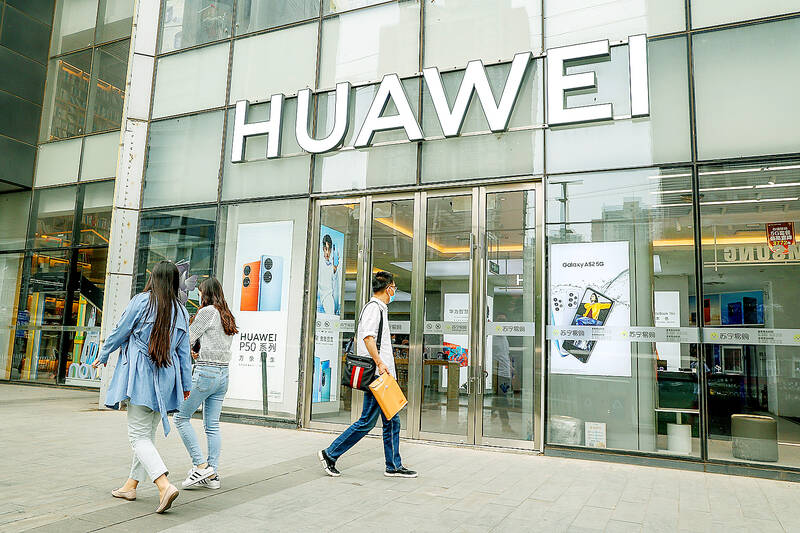The US Federal Communications Commission (FCC) is to ban approvals of new telecommunications equipment from China’s Huawei Technologies Inc (華為) and ZTE Corp (中興) in the US on national security grounds, an agency document said.
FCC Chairwoman Jessica Rosenworcel last week circulated the proposed ban to the other three commissioners for final approval.
The companies are not to be able to sell new equipment in the US without authorizations.

Photo: EPA
“The FCC remains committed to protecting our national security by ensuring that untrustworthy communications equipment is not authorized for use within our borders, and we are continuing that work here,” Rosenworcel said in a statement on Thursday.
The FCC faces a congressional deadline next month to act.
The FCC voted in June last year to ban approvals for equipment in US telecommunications networks from Chinese companies deemed national security threats, including Huawei and ZTE.
That came after a designation in March last year of five Chinese companies on the so-called “covered list” as posing a threat to national security under a 2019 law aimed at protecting US communications networks: Huawei, ZTE, Hytera Communications Corp (海能達通訊), Hangzhou Hikvision Digital Technology Co (杭州海康威視數字技術) and Zhejiang Dahua Technology Co (浙江大華技術).
The FCC in June last year said that it was considering banning all equipment authorizations for all companies on the covered list.
This year, the FCC added Russia’s AO Kaspersky Lab, China Telecom (Americas) Corp, China Mobile International USA, Pacific Networks Corp and China Unicom (Americas) to the covered list.
FCC Commissioner Brendan Carr last year said that the FCC had approved more than 3,000 applications from Huawei since 2018.
In 2019, the US placed Huawei, Hikvision and other firms on its economic blacklist.
Also in 2020, the FCC designated Huawei and ZTE as national security threats — a declaration that barred US companies from tapping an US$8.3 billion government fund to purchase equipment from the companies.
Earlier this year, the Chinese embassy in Washington said that the FCC “abused state power and maliciously attacked Chinese telecom operators again without factual basis.”

CALL FOR SUPPORT: President William Lai called on lawmakers across party lines to ensure the livelihood of Taiwanese and that national security is protected President William Lai (賴清德) yesterday called for bipartisan support for Taiwan’s investment in self-defense capabilities at the christening and launch of two coast guard vessels at CSBC Corp, Taiwan’s (台灣國際造船) shipyard in Kaohsiung. The Taipei (台北) is the fourth and final ship of the Chiayi-class offshore patrol vessels, and the Siraya (西拉雅) is the Coast Guard Administration’s (CGA) first-ever ocean patrol vessel, the government said. The Taipei is the fourth and final ship of the Chiayi-class offshore patrol vessels with a displacement of about 4,000 tonnes, Lai said. This ship class was ordered as a result of former president Tsai Ing-wen’s (蔡英文) 2018

UKRAINE, NVIDIA: The US leader said the subject of Russia’s war had come up ‘very strongly,’ while Jenson Huang was hoping that the conversation was good Chinese President Xi Jinping (習近平) and US President Donald Trump had differing takes following their meeting in Busan, South Korea, yesterday. Xi said that the two sides should complete follow-up work as soon as possible to deliver tangible results that would provide “peace of mind” to China, the US and the rest of the world, while Trump hailed the “great success” of the talks. The two discussed trade, including a deal to reduce tariffs slapped on China for its role in the fentanyl trade, as well as cooperation in ending the war in Ukraine, among other issues, but they did not mention

HOTEL HIRING: An official said that hoteliers could begin hiring migrant workers next year, but must adhere to a rule requiring a NT$2,000 salary hike for Taiwanese The government is to allow the hospitality industry to recruit mid-level migrant workers for housekeeping and three other lines of work after the Executive Yuan yesterday approved a proposal by the Ministry of Labor. A shortage of workers at hotels and accommodation facilities was discussed at a meeting of the legislature’s Transportation Committee. A 2023 survey conducted by the Tourism Administration found that Taiwan’s lodging industry was short of about 6,600 housekeeping and cleaning workers, the agency said in a report to the committee. The shortage of workers in the industry is being studied, the report said. Hotel and Lodging Division Deputy Director Cheng

TOKYO SUMMIT: The new Japanese PM’s words have demonstrated Japan’s ‘firm position on urging the prioritization of cross-strait peace,’ the foreign ministry said Minister of Foreign Affairs Lin Chia-lung (林佳龍) yesterday thanked US President Donald Trump and Japanese Prime Minister Sanae Takaichi for supporting peace in the Taiwan Strait, a day after the two at a summit in Tokyo emphasized the importance of regional stability and ahead of a meeting between Trump and Chinese President Xi Jinping (習近平) in South Korea today. The previous day’s meeting was the first time Takaichi had met with the US leader since becoming Japanese prime minister, the Ministry of Foreign Affairs said in a statement. Since taking office on Tuesday last week, Takaichi has urged the international community to